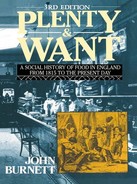Preface to the third edition
Since the first edition of Plenty and Want in 1966 food history has come of age, and it is no longer true to say, as in the earlier Preface, that ‘little or no serious attempt has ever been made to study the changes that have taken place in man’s basic needs since Britain became an industrial society’. Food history is now an accepted area of scholarly research, and no serious account of the economic and social transformation of Britain during the past two centuries now omits reference to the changing ways in which food has been grown, manufactured, distributed, and consumed.
This new edition allows me to do two things. First, it enables me to acknowledge and incorporate some of the more important research findings of the last twenty years by scholars who have worked over neglected areas of this wide terrain: they range from studies of individual firms and commodities to methods of transport and marketing, patterns of consumption, and nutritional evaluations. Much of this research was first presented in the form of papers to the Historians and Nutritionists Seminar at Queen Elizabeth College, University of London, which began in 1963 and has met regularly ever since. Historians and nutritionists have both benefited from acquaintance with the other’s discipline, and three valuable volumes of papers have resulted to which my debt will be obvious. Of the many scholars who have contributed to the success of this seminar, special mention should be made of Professor John Yudkin and the late Dr Derek Miller who led the nutritionists’ ‘side’, and Professors Theo Barker and Derek Oddy who have represented the historians.
Second, this edition brings the account of dietary changes up to 1985, the latest date for which official statistics are available: readers who are especially interested in current trends can update Table 49 as future Annual Reports of the National Food Survey Committee are published. For the recent period my particular thanks are due to Dr Dorothy Hollingsworth, former Director General of the British Nutrition Foundation, and to Dr D.H. Buss of the Nutrition Section of the Ministry of Agriculture, Fisheries, and Food. It is scarcely necessary to say that no one is responsible for opinions expressed in this book except myself, but it is necessary for me warmly to thank Valerie Radford who battled so successfully and uncomplainingly with my illegibility.
Although the title of this book still seems appropriate, there has been a small change to the subtitle from ‘A social history of diet’ to ‘A social history of food’. The word ‘diet’ was technically correct, but was sometimes interpreted in a particular, narrow way — so much so that some public libraries catalogued the book under ‘cookery’, ‘domestic science’, and even ‘slimming’. Though it relates to all and more of these, it properly belongs to history.
